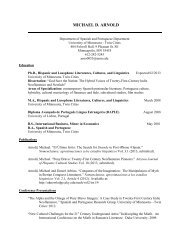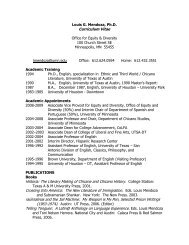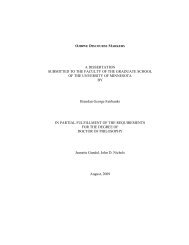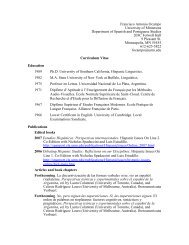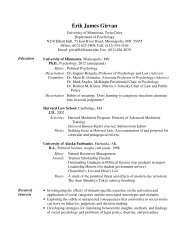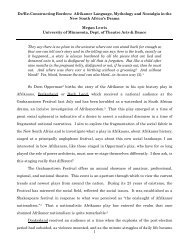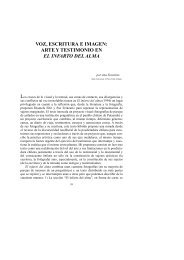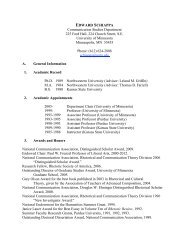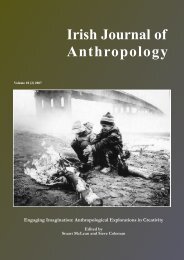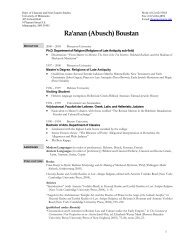Source Cues, Partisan Identities, and Political Value Expression
Source Cues, Partisan Identities, and Political Value Expression
Source Cues, Partisan Identities, and Political Value Expression
Create successful ePaper yourself
Turn your PDF publications into a flip-book with our unique Google optimized e-Paper software.
CUES, PARTY, AND VALUES 807<br />
positing that party identification has temporal priority<br />
over, <strong>and</strong> thus, the ability to shape, some political values.<br />
To be clear, we are not claiming that core political<br />
values are akin to other short-term perceptions. We believe,<br />
like many others, that political values are central<br />
elements in mass belief systems. Nor do we expect that<br />
partisan influence will produce wholesale value change.<br />
Instead, partisan forces should affect values at the margins,<br />
essentially leading identifiers to become a little bit<br />
more or less enamored of a given value.<br />
To summarize our first theoretical claim: since partisan<br />
identities are more basic orientations than political<br />
values <strong>and</strong> partisan biases are activated easily in the<br />
presence of partisan source cues, we anticipate that the<br />
expression of political values will move in response to<br />
partisan appeals. This theoretical framework leads to the<br />
following pair of expectations. Our first hypothesis is<br />
that the relationship between individual partisan identities<br />
<strong>and</strong> positions on political values will become more<br />
pronounced in the presence of party source cues. Our second<br />
hypothesis is that when political values are endorsed<br />
by Democrats, support will rise among Democratic identifiers<br />
<strong>and</strong> fall among Republicans. Similarly, values accompanied<br />
by Republican endorsements should see a rise<br />
in support among GOP partisans <strong>and</strong> declining support<br />
among Democrats.<br />
Two refinements are necessary to establish some<br />
boundary conditions for our theory. First, there are<br />
grounds for suspecting that source cues will have asymmetrical<br />
effects on value expression. Specifically, party<br />
cues should produce larger changes in value support<br />
among opposition partisans compared to like-minded<br />
partisans. In other words, a type of negativity bias should<br />
be present. The superior power of negative information<br />
over positive information is firmly established in psychological<br />
literatures (for a review, see Baumeister et al.<br />
2001). Although several explanations exist as to why negative<br />
information is more powerful, the most relevant, in<br />
our view, is the “figure-ground” explanation. This perspective<br />
holds that negative information is more consequential<br />
for information processing <strong>and</strong> judgment than<br />
equally extreme, positive information because it st<strong>and</strong>s<br />
out against a positive background (Lau 1985).<br />
Since political values are quite popular, the perceptual<br />
background surrounding them is positive. Hence,<br />
when perceivers encounter a value message with an outparty<br />
endorsement, the negative valence of the out-party<br />
cue will contrast with the positive valence of the value.<br />
However, for perceivers who share a party label with a<br />
source, the entire message is positive. The net result is that<br />
out-partisans, who confront some negative information,<br />
should move more than in-partisans, who encounter en-<br />
tirely positive information. To illustrate, Democratic endorsement<br />
of equal opportunity should diminish Republican<br />
support more than it enhances Democratic support.<br />
This leads to our third hypothesis. When a political value<br />
is sanctioned by a political party, the drop in expressed<br />
support for the value among opposition partisans will be<br />
greater than the rise in expressed support among likeminded<br />
partisans. 3<br />
Our next theoretical refinement centers on the role<br />
liberal-conservative identification likely plays in the process.<br />
We define this construct as a sense of psychological<br />
attachment to an ideological label based on feelings<br />
about liberal or conservative groups, ideas, or symbols<br />
(Conover <strong>and</strong> Feldman 1981). We think that the influence<br />
of the party source cue will be stronger among ideologically<br />
congruent partisans (i.e., liberal Democrats) than<br />
when ideologically congruent <strong>and</strong> incongruent partisans<br />
are grouped together (i.e., liberal <strong>and</strong> moderate <strong>and</strong> conservative<br />
Democrats).<br />
Why should this be so? Imagine a pair of Democrats<br />
identical in all respects save that the first is conservative,<br />
the second liberal. Upon hearing that conservative<br />
Republicans support the principle of self-reliance, their<br />
reactions may differ. The liberal Democrat confronts reinforcing<br />
pressures—one partisan, one ideological—to cool<br />
her enthusiasm for self-reliance. In contrast, the conservative<br />
Democrat is cross-pressured: partisanship dictates<br />
less enthusiasm, ideology more. It seems plausible that the<br />
liberal Democrat will express less support for self-reliance<br />
than the conservative Democrat. When we compare responses<br />
for liberal Democrats alone to those of liberals<br />
<strong>and</strong> moderates <strong>and</strong> conservatives inclusive, the ideologically<br />
“pure” should prove more responsive to source cues<br />
than the ideologically “mixed.” Thus, our fourth hypothesis<br />
predicts greater shifts in value endorsement among<br />
ideologically congruent partisans versus the ideologically<br />
pure <strong>and</strong> cross-pressured.<br />
To repeat, the first major prediction our theory makes<br />
is that party cues will condition the impact partisan loyalties<br />
have on political values under varying circumstances.<br />
In addition to shaping individual value positions, we expect<br />
party cues will influence how discrete values are<br />
organized into broader value systems. More succinctly,<br />
our final hypothesis predicts that party cues will enhance<br />
3 Note that we are looking for negativity bias in situations where<br />
it should be most likely to obtain. For instance, Democratic endorsement<br />
of equal opportunity should produce stronger negative<br />
reactions for Republicans than positive reactions for Democrats.<br />
For reasons to be discussed below, we are not looking at what<br />
happens if Republicans praise equality. In this case, one might expect<br />
GOP support for equal opportunity to rise while Democratic<br />
support holds steady. That is to say, negativity bias would not be<br />
present.



